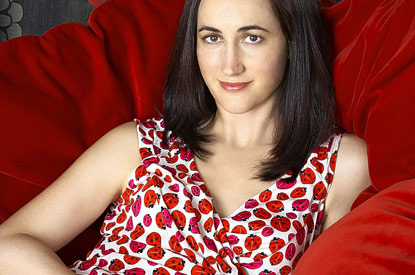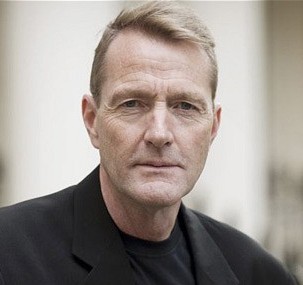A Culture Show Special: The Books We Really Read, BBC Two | reviews, news & interviews
A Culture Show Special: The Books We Really Read, BBC Two
A Culture Show Special: The Books We Really Read, BBC Two
What the popular bestseller can teach the literary novel. Apparently
Unlike Sue Perkins, I’ve never sat on the Booker Prize judging panel. So I’ve never had the dubious pleasure of wading through 130-plus contemporary “literary” novels, of supremely variable quality, in a supremely short space of time (it’s approximately a novel a day, I’ve heard, given the allocated time). But still, I was left somewhat puzzled by the Culture Show special, The Books We Really Read, because Perkins – who was a Booker Prize judge in 2009 and is yet to recover from the experience – comes to a conclusion I found slightly odd.
She concluded that the contemporary literary novel is missing something, something rather vital to its ongoing health. Can you guess what it is? If you haven’t yet had the chance to tune in, here’s a clue: it’s something that the airport blockbuster has in spades, and its poor literary cousin doesn’t. Anaemic and rambling, weakened by the weight of its literary tropes and metaphors and sub-clauses, the literary novel can barely sustain itself let alone the reader. It needs a plot! Yes, that vital fictional device that keeps the reader from slipping into a boredom-induced coma. Or simply just makes them eager to turn the page.
 Having been a self-confessed “literary snob” all her life – she actually blushes when she tells a Sophie Kinsella-loving hairdresser (Kinsella pictured right) that her favourite book is Crime and Punishment (not because it’s a shaming confession in itself, of course, but because she knows the hairdresser will probably never have heard of it and Perkins, being self-effacingly polite, wishes to avoid a socially awkward moment) - it’s true to say that Perkins’s Booker experiences have left her weary, exasperated and just plain fed up.
Having been a self-confessed “literary snob” all her life – she actually blushes when she tells a Sophie Kinsella-loving hairdresser (Kinsella pictured right) that her favourite book is Crime and Punishment (not because it’s a shaming confession in itself, of course, but because she knows the hairdresser will probably never have heard of it and Perkins, being self-effacingly polite, wishes to avoid a socially awkward moment) - it’s true to say that Perkins’s Booker experiences have left her weary, exasperated and just plain fed up.
We learn that of the 134 books she read for the award, at least 100 were "completely plotless". Oh yes, she said, they seemed to delight in language – though you might wonder whether that’s actually true (they might think they’re delighting in the rhythms and cadences of the written word, but it’s probably truer to say that many “literary” writers who self-consciously think of themselves as literary writers, often just aren’t that good) – but these, she said, just went on and on, making heavy weather of description, giving the reader no impetus to continue reading because the reader had given up caring what the characters did next.
In short, the books she had come across were episodic – but apparently not in an interesting way – and meandering (which can never be interesting). Without the structuring framework of a plot, they had a tendency to droop, and so did the reader.
But hang on, this isn’t because they were “literary” novels, surely? It’s because they just weren’t very good. And I’d venture to add that the authors remained plotless not because they were consciously eschewing plot (though some may have been) but probably because they were just not very good at constructing one, which is a special talent in itself. And so it’s indeed the case that writers who aren’t very good at structure, often do just end up writing a series of uneven vignettes, which are kind of all loosely related, but not really pulled together with any rigour or purpose or sense of tension. In other words, these writers just haven’t mastered structure, and they probably think that plot is just this strange alien device that, without any sense of interconnectedness, just goes something like this: this happens, then this happens… and then this… until we all die of boredom.
Moreover, it’s silly, isn’t it, to go to genre novels – those thrillers and crime novels and chick-lit romances that are “the books we really read” – in order to rediscover plot, in the false belief that thrilling page-turners aren’t being written by literary novelists? Which contemporary literary novelists has Perkins been reading lately?
And we’re not talking about the experimental, or the fag-end Post-Modernist novelist, just the straightforwardly literary one, many of whom do stick rather solidly to the conventional 19th-century literary model. Does Alan Hollinghurst not get plot? Was Iris Murdoch ever plotless? These are just two literary novelists that I would easily describe as writers of thrilling, page-turning fiction. And what about Ishiguro? One doesn’t want to make a list, but the landscape is hardly arid.
 Lee Child (pictured left) was among the bestselling novelists Perkins talked to. And, well, I admit that I haven’t read anything of his, but nor am I tempted after hearing a sample paragraph of one of his macho Jack Reacher novels read out here. It was dreadfully badly written, as I'm convinced Perkins would agree.
Lee Child (pictured left) was among the bestselling novelists Perkins talked to. And, well, I admit that I haven’t read anything of his, but nor am I tempted after hearing a sample paragraph of one of his macho Jack Reacher novels read out here. It was dreadfully badly written, as I'm convinced Perkins would agree.
And then we have writers such as Ruth Rendell, who also featured. Rendell not only understands plot but she’s a genre writer who writes extremely well. Why shouldn’t critics and academics rate her? They do, because they recognise a thrillingly good writer when they read one. And what about, for instance, Sarah Waters, a historical genre writer who understands perfectly the literary conventions of the plot-driven 19th-century novel, and provides thrills and spills aplenty? Far more so than many of the other dreary bestsellers clogging up the shelves of WH Smiths.
It’s hardly worth saying this, because it’s such an obvious point, but there are brilliant bestselling genre writers and there are rubbish ones, and there are fair to middling ones, too. And the same goes for literary authors. But by the end of The Books We Really Read, Perkins is expressing her frustration over the “plotless” literary novel, and longing for what the readers of bestselling genre novels experience – the tenterhooks anticipation of “what happens next”.
Maybe there’s something wrong with the Booker Prize (though we can’t expect to find a brilliant crop of novels every year – great novelists, like great artists, are not a common breed). Maybe Perkins just needs a break from reading – it happens. But the literary novel, as far as I can tell, can still remember what a good plot is. And it doesn't really need to be patronised in a strained, and probably rather dishonest, act of reverse snobbery. Sue, your first instincts were largely correct, I'd say. So leave that copy of The Da Vinci Code alone!
- Watch The Books We Really Read on BBC iPlayer
Add comment
more TV
 Blue Lights Series 2, BBC One review - still our best cop show despite a slacker structure
The engaging Belfast cops are less tightly focused this time around
Blue Lights Series 2, BBC One review - still our best cop show despite a slacker structure
The engaging Belfast cops are less tightly focused this time around
 Baby Reindeer, Netflix review - a misery memoir disturbingly presented
Richard Gadd's double traumas are a difficult watch but ultimately inspiring
Baby Reindeer, Netflix review - a misery memoir disturbingly presented
Richard Gadd's double traumas are a difficult watch but ultimately inspiring
 Anthracite, Netflix review - murderous mysteries in the French Alps
Who can unravel the ghastly secrets of the town of Lévionna?
Anthracite, Netflix review - murderous mysteries in the French Alps
Who can unravel the ghastly secrets of the town of Lévionna?
 Ripley, Netflix review - Highsmith's horribly fascinating sociopath adrift in a sea of noir
Its black and white cinematography is striking, but eventually wearying
Ripley, Netflix review - Highsmith's horribly fascinating sociopath adrift in a sea of noir
Its black and white cinematography is striking, but eventually wearying
 Scoop, Netflix review - revisiting a Right Royal nightmare
Gripping dramatisation of Newsnight's fateful Prince Andrew interview
Scoop, Netflix review - revisiting a Right Royal nightmare
Gripping dramatisation of Newsnight's fateful Prince Andrew interview
 RuPaul’s Drag Race UK vs the World Season 2, BBC Three review - fun, friendship and big talents
Worthy and lovable winners (no spoilers) as the best stay the course
RuPaul’s Drag Race UK vs the World Season 2, BBC Three review - fun, friendship and big talents
Worthy and lovable winners (no spoilers) as the best stay the course
 This Town, BBC One review - lurid melodrama in Eighties Brummieland
Steven Knight revisits his Midlands roots, with implausible consequences
This Town, BBC One review - lurid melodrama in Eighties Brummieland
Steven Knight revisits his Midlands roots, with implausible consequences
 Passenger, ITV review - who are they trying to kid?
Andrew Buchan's screenwriting debut leads us nowhere
Passenger, ITV review - who are they trying to kid?
Andrew Buchan's screenwriting debut leads us nowhere
 3 Body Problem, Netflix review - life, the universe and everything (and a bit more)
Mind-blowing adaptation of Liu Cixin's novel from the makers of 'Game of Thrones'
3 Body Problem, Netflix review - life, the universe and everything (and a bit more)
Mind-blowing adaptation of Liu Cixin's novel from the makers of 'Game of Thrones'
 Manhunt, Apple TV+ review - all the President's men
Tobias Menzies and Anthony Boyle go head to head in historical crime drama
Manhunt, Apple TV+ review - all the President's men
Tobias Menzies and Anthony Boyle go head to head in historical crime drama
 The Gentlemen, Netflix review - Guy Ritchie's further adventures in Geezerworld
Riotous assembly of toffs, gangsters, travellers, rogues and misfits
The Gentlemen, Netflix review - Guy Ritchie's further adventures in Geezerworld
Riotous assembly of toffs, gangsters, travellers, rogues and misfits
 Oscars 2024: politics aplenty but few surprises as 'Oppenheimer' dominates
Christopher Nolan biopic wins big in a ceremony defined by a pink-clad Ryan Gosling and Donald Trump seeing red
Oscars 2024: politics aplenty but few surprises as 'Oppenheimer' dominates
Christopher Nolan biopic wins big in a ceremony defined by a pink-clad Ryan Gosling and Donald Trump seeing red

Comments
...